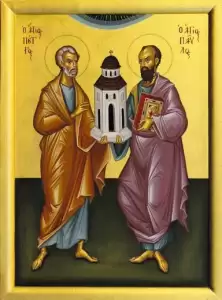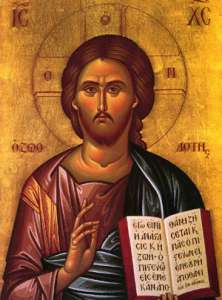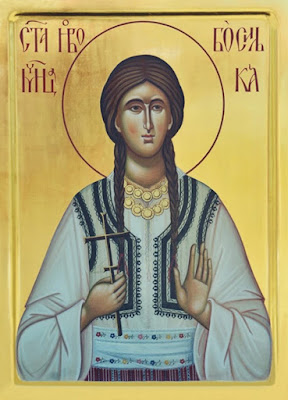Warning: Undefined array key "margin_above" in /home/stscahvallejo/public_html/wp-content/plugins/ultimate-social-media-icons/libs/controllers/sfsiocns_OnPosts.php on line 652
Warning: Undefined array key "margin_below" in /home/stscahvallejo/public_html/wp-content/plugins/ultimate-social-media-icons/libs/controllers/sfsiocns_OnPosts.php on line 653
Spiritual cultivation can take place only in the soil of the heart, for within it one can plant and sow spiritual seed. Then the rain of the energy of the Holy Spirit comes and brings forth fruit, which will be kept in two accounts: firstly in Heaven, and then in the earthly account for the poor and for those who hunger spiritually.
Elder Amphilochios Makris of Patmos
October 2022
For Sunday, October 16
 Epistle Reading
Epistle Reading
The reading is from St. Paul's Letter to Titus 3:8-15
Titus, my son, the saying is sure. I desire you to insist on these things, so that those who have believed in God may be careful to apply themselves to good deeds; these are excellent and profitable to men. But avoid stupid controversies, genealogies, dissensions, and quarrels over the law, for they are unprofitable and futile. As for a man who is factious, after admonishing him once or twice, have nothing more to do with him, knowing that such a person is perverted and sinful; he is self-condemned.
When I send Artemas or Tychicos to you, do your best to come to me at Nicopolis, for I have decided to spend the winter there. Do your best to speed Zenas the lawyer and Apollos on their way; see that they lack nothing. And let our people learn to apply themselves to good deeds, so as to help cases of urgent need, and not to be unfruitful. All who are with me send greeting to you. Greet those who love us in the faith. Grace be with you all. Amen.
What is a heretic?
The word heretic comes from the Greek word αἱρετικός (aeretikos) which means one who is divisive. Aeretikos is a derivative of the word αἱρέω (aereo) which is a verb meaning to choose. So the word heretic refers to a person who has chosen his own opinion, stance or belief and he elevates it above everything else, even if it divides him from others. We see in the epistle reading that already at the time of the apostles there were heretics who refused to listen to and obey the teachings of the apostles but insisted on their own opinions and ideas. St. Paul says that such people had to be warned once or twice. But if they refused to listen, they revealed themselves as "perverted", "sinful," and "self-condemned" and to have nothing more to do with them.
This epistle reading that we will read on Sunday deals with the issue of heretics because this Sunday is the commemoration of the 7th Ecumenical Council. At this council, the heresy of iconoclasm and the heretics who supported it were condemned by the Church. These were individuals who had persecuted the faithful and the clergy for their practice of venerating icons. Many icons were destroyed and people were even imprisoned and killed for having icons or wanting to venerate them. But thankfully the truth and the pious tradition of the people as well as the theological basis for having and venerating icons prevailed.
The primary factor that maintains and determines unity in the Church is having a common belief. All the ecumenical councils affirmed the doctrines and beliefs that the Church had preserved since the time of the Apostles and rejected false teachings and false teachers who were leading people astray. Unity in the Church is of utmost importance. For this reason, we recite the Nicene Creed; which is our statement of faith. The idea of oneness and singularity is stressed four times: "I believe in One God....In One Lord Jesus Christ.....In One, Holy, Catholic and Apostolic Church...In One baptism for the forgiveness of sins).
Therefore, the One Church is the Body of the One Jesus Christ who is the One true God. St. Paul stresses this elsewhere saying, that there is "One Lord, one faith, one baptism" (Ephesians 4:5-7). A person is either in the Church and therefore in Christ or he has separated himself from it and from Christ because of sins or because he teaches or believes heresies. Yet the Church, as the mystical Body of Christ, remains like a rock, unchanged, immovable, forever and ever and all are welcomed back to rejoin it by adhering to its teachings and by confession and repentance.
The 3rd century Church Father, St. Cyprian of Carthage, comments on the epistle reading for today, illustrating the unity and the purpose of the Church, as well as what happens to heretics:
"The Church cannot be rent or divided against itself. It maintains the unity of a single, indivisible house…. All who are to live and escape the destruction of the world must be gathered into one house alone: the Church. If any of the gathered goes outside, that is, if anyone who once obtained grace in the Church nevertheless abandons the Church, his blood will be upon his head. He will have himself to blame for his damnation. The apostle Paul explains this, directing us to avoid a heretic as perverted, sinful and self-condemned."
Questions:
- Why is it so important that we all believe the same thing in the Church?
 Gospel Reading
Gospel Reading
Sunday of the 7th Ecumenical Council
Luke 8:5-15
The Lord said this parable: "A sower went out to sow his seed; and as he sowed, some fell along the path, and was trodden under foot, and the birds of the air devoured it. And some fell on the rock; and as it grew up, it withered away, because it had no moisture. And some fell among thorns; and the thorns grew with it and choked it. And some fell into good soil and grew, and yielded a hundredfold." And when his disciples asked him what this parable meant, he said, "To you it has been given to know the secrets of the kingdom of God; but for others they are in parables, so that seeing they may not see, and hearing they may not understand. Now the parable is this: The seed is the word of God. The ones along the path are those who have heard; then the devil comes and takes away the word from their hearts, that they may not believe and be saved. And the ones on the rock are those who, when they hear the word, receive it with joy; but these have no root, they believe for a while and in time of temptation fall away. And as for what fell among the thorns, they are those who hear, but as they go on their way they are choked by the cares and riches and pleasures of life, and their fruit does not mature. And as for that in the good soil, they are those who, hearing the word, hold it fast in an honest and good heart, and bring forth fruit with patience." As he said these things, he cried out "He who has ears to hear, let him hear."
Why did Christ speak in Parables?
What David said of old, speaking prophetically in the person of Christ, has now come to pass: 'I will open My mouth in parables.' [Ps. 77:2] The Lord speaks in parables for many reasons: to make His listeners more attentive and to stir up their minds to seek the meaning of what is said. For we are apt to be curious about sayings that are obscure in meaning and to disregard sayings that are clear.
He also speaks in parables so that those who are unworthy may not understand what is said concerning spiritual mysteries. And there are many other reasons why He speaks in parables. A sower, therefore, went out, that is, the Son of God went forth from the Fathers bosom, from the hidden fastness of the Father, and became manifest to all. Who went out? He Who is ever sowing. The Son of God never ceases to sow in our souls. Not only by His teaching, but by all of creation and by the events of our daily lives, He plants good seed in our souls. He went out, not to slay trespassers or to burn off the stubble, but to sow.
For there are many reasons why a farmer might go forth, besides to plant. He went out to sow His own seed: the word of teaching was His own, and not another's. The prophets had spoken, not their own words, but the words of the Holy Spirit. This is why they said, Thus saith the Lord. But Christ had His own seed to sow. When He taught, He did not say, "Thus saith the Lord," but, "I say unto you." As He sowed, that is, as He taught, some seed fell along the road. He did not say that the sower threw the seed along the road, but instead that some fell there. Christ the Sower sows and teaches, and His word falls upon his listeners everywhere, and it is they who show themselves to be like a road, or a rock, or thorns, or good soil. When the disciples ask about the parable, the Lord says, Unto you it is given to know the mysteries of the kingdom of God, that is, unto you who desire to learn, for everyone that asketh, receiveth. [Mt. 7:8] To the others who are not worthy of the mysteries, He speaks obscurely. They think that they see, but they do not; they hear, but they do not understand. And this is to their benefit. The Lord hides these things from them so that they will not fall under greater condemnation for understanding the mysteries and then disregarding them. He who understands, and then disregards, deserves a more severe punishment.
St. Theophylact of Ochrid
 New Martyr Bosiljka Rajicic of Pasjane
New Martyr Bosiljka Rajicic of Pasjane
Bosiljka lived in the mid-nineteenth century in eastern Kosovo. She led an average peasant life, helping her family harvest their crops and tending to the farm animals. Under Ottoman oppression, their village no longer had a church, so Bosiljka often walked about eleven miles each way to the Draganac Monastery hidden in the mountains to pray and receive Holy Communion. While she was seventeen, her family traveled to a town that still had a functioning Orthodox parish for the feast of St. Elijah. While there, a Muslim Albanian saw Bosiljka's beauty and innocence and implored her to convert to his religion and become his wife, and he promised her many gifts. When she rebuked him, he was offended, and so he kidnapped her and took her to his home. He tried starving her into submission, but she said that no torture could take her from her love of Christ. He also tried to persuade her through a former Orthodox Christian Serbian woman who had converted to Islam. This woman tried to convince her to accept Islam for the sake of her own life and for the safety of her family. Young Bosiljka responded again that she needed no faith other than that of the Orthodox, and that as for a husband — she already had one. Curious, the Muslim Serbian woman asked her who this husband is, to which Bosiljka said, “Christ, of course! He is my bridegroom, I belong to Him alone, and I will not renounce Him or my Holy Faith, unlike you, whom I pity.”
The Muslim Serb responded, “Don’t be so stubborn, convert and save your soul!” to which Bosiljka firmly responded, “That’s not how you save your soul, but rather, how you lose it.”
Frustrated, the Muslim Serbian woman returned Bosiljka to the Albanian Muslim who had fallen in love with her, who again tried to convince her to convert and marry him. Failing utterly, further tortures awaited Bosiljka, which she bore with bravery, strength, and great faith in Christ. They held her face above a chimney to choke her with the smoke, then threw hot coals on her. To this, Bosiljka’s only response was “Kill me, all you can do is kill my body, but I will remain an Orthodox Christian, I will remain with Christ, I will remain pure, and this you cannot take from me!”
Humiliated at his inability to make the seventeen-year-old girl change her mind, the Albanian Muslim tied Bosiljka to a horse and dragged her to the edge of the town, where he and several of his friends slowly cut the martyr into pieces while she was yet living, as they screamed “Death to the filthy Serb!” The whole time, Bosiljka is said to have just repeated the words “God, grant me to endure to the end, don’t let me give in, help me to endure to the end!” Her final words were: “This is not my death, this is not my end, rather, this is the beginning of my eternal life. It is you, rather, who have died for eternity.” And thus, she gave up her soul to Christ her Bridegroom, after many tortures, showing much courage and giving a great witness to the love and truth of Christ.
And so the life of a teenage girl from a small village in Kosovo, who otherwise would probably have been long since forgotten, has entered into eternity, and has come to warm our hearts today. Holy Martyr Bosiljka, along with many other New Martyrs of the Turkish Yoke, was an average person: She was not a nun, nor a great ascetic, nor a theologian; her village did not even have a church during her lifetime. And yet, when it was asked of her, she gave her life for Christ, and that with much pain and suffering. Her life cries out to us through the centuries as a witness to the great love and power of Christ, of the great glories awaiting those who are faithful to Him, and to the reality that every person can be a saint. It is not only monks and nuns who are called to sanctity, but all Christians—from a seventeen-year- old girl, as in the case of Bosiljka, to bakers, gardeners, and shopkeepers, as in the case of other martyrs of the Ottoman Yoke. The life of this girl from a small village in Kosovo proclaims to all of us, throughout the world, throughout time, that we can all be holy, and that not only is this a possibility, but it is what is required of us.
(Source: Orthodox Lives of the Saints & Mystagogy )
- What impressed you most about St. Bosiljka?
- What do you think made her have such faith?
- Can you imagine yourself in the same situation as her? What would you have done?
Thank you for participating in SOFIA! If you've subscribed to our newsletter, look for an email notification next week when a new lesson page is posted. See you Sunday!

 Weekly catechism and spiritual devotion for the Orthodox home
Weekly catechism and spiritual devotion for the Orthodox home